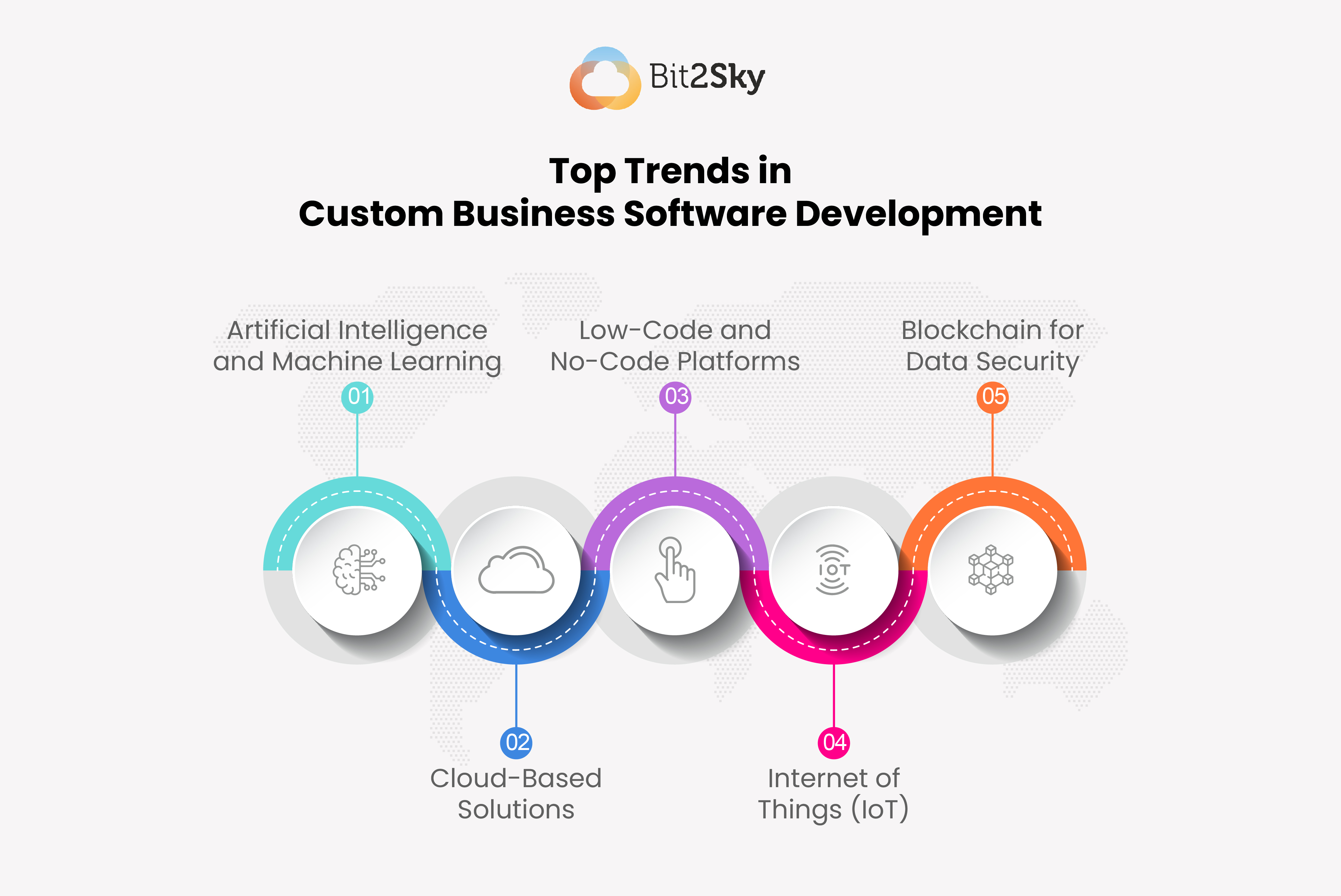Table of Contents
Custom business software development allows companies to build solutions that cater to their unique needs, unlike off-the-shelf products that may not address specific requirements. This blog will explore the ins and outs of custom business software development, the benefits it provides, the trends shaping the future, and practical advice on implementing the right solution for your organization.
1. What is Custom Business Software Development?
Custom business software development refers to the process of designing, creating, and deploying software specifically tailored to a business's needs. These solutions are designed from the ground up to solve particular problems, optimize workflows, and improve overall business performance.
Unlike pre-built, generic software, custom solutions provide the flexibility to scale, adjust features, and integrate with existing systems, ensuring that the software evolves as the business grows.
In the digital world, businesses that demonstrate high levels of experience and expertise tend to gain more customer trust and industry authority. Custom software development enables businesses to create unique and innovative solutions that show their commitment to providing the best customer experience.
2. Why Custom Software Over Off-The-Shelf Solutions?
2.1. Tailored to Business Needs
Off-the-shelf software is designed to meet the needs of a broad audience, which means it may come with unnecessary features or lack specific functionality that your business requires. Custom business software development ensures that you get exactly what you need and nothing more, resulting in higher efficiency and productivity.
2.2. Scalability
As your business grows, so will your software requirements. Custom software allows you to scale as needed without the limitations of a pre-built system. Whether you need to add new users, expand functionality, or handle increased data volumes, custom software grows with your business.
2.3. Better Integration
Many businesses operate with multiple software systems that need to communicate with each other. Custom software solutions are designed to integrate seamlessly with your existing tools and platforms, creating a unified system that reduces redundancies and enhances performance.
2.4. Enhanced Security
Off-the-shelf software is often a target for hackers due to its widespread use and known vulnerabilities. Custom software, on the other hand, is unique to your business, making it less attractive to cybercriminals and easier to secure.
3. Benefits of Custom Business Software Development
3.1. Improved Efficiency and Productivity
Custom business software automates manual processes, reducing the likelihood of human error and freeing up employees to focus on high-value tasks. This not only boosts productivity but also ensures that business operations run smoothly.
3.2. Cost-Effective in the Long Run
Although the initial investment for custom software may be higher than purchasing off-the-shelf solutions, it becomes more cost-effective in the long term. You won’t have to pay for features you don’t need or costly updates that may not align with your business goals.
3.3. Competitive Advantage
Custom software enables businesses to create unique features that competitors may not have, providing a competitive edge. This could be anything from a more efficient supply chain system to better customer relationship management.
3.4. Full Ownership and Control
With custom software, you have complete control over the features, updates, and changes to the software. This allows for greater flexibility and the ability to quickly adapt to new market demands or internal process changes.
3.5. Enhanced Customer Experience
Custom business software can be designed to enhance customer interactions, making processes smoother and faster. Whether through better user interfaces, more personalized services, or improved communication tools, the result is a better experience for your customers.
4. Types of Custom Business Software
4.1. Enterprise Resource Planning (ERP) Systems
Custom ERP software helps businesses manage their core processes, including inventory management, financial accounting, human resources, and supply chain operations, all from a single platform.
4.2. Customer Relationship Management (CRM) Software
CRM software helps businesses manage their interactions with current and potential customers. A custom CRM solution can be tailored to fit the exact workflows and communication processes that your business follows.
4.3. E-commerce Platforms
For businesses operating online stores, custom e-commerce platforms can be designed to fit specific sales strategies, customer engagement tactics, and inventory management systems.
4.4. Project Management Tools
Custom project management software allows businesses to track and manage their projects efficiently. Features like task assignments, progress tracking, time management, and collaboration tools can be built specifically for your team’s workflow.
4.5. Inventory and Supply Chain Management Systems
For businesses with complex inventory and supply chains, custom software ensures smooth operations by automating inventory tracking, predicting demand, and optimizing supply chain processes.
5. How to Choose the Right Software Development Partner
5.1. Industry Experience
Ensure that the development partner you choose has experience in your specific industry. Different industries have different regulatory requirements, processes, and standards, so a partner with relevant experience can help you navigate these complexities.
5.2. Technical Expertise
Look for a development partner that has a strong technical team capable of handling complex projects. Check their portfolio and reviews to verify their technical skills.
5.3. Communication and Transparency
Good communication is key to any successful project. Choose a partner who is transparent in their processes, timelines, and cost estimates. They should keep you informed throughout the development process and be open to your feedback.
5.4. Post-Launch Support
Custom software requires regular updates, maintenance, and support. Ensure that your development partner provides ongoing support after the software is launched to fix bugs, implement updates, and provide technical assistance.
6. Top Trends in Custom Business Software Development
6.1. Artificial Intelligence and Machine Learning
AI and ML are revolutionizing the way businesses operate by providing predictive analytics, automation, and smarter decision-making. Custom software that integrates AI can help businesses improve efficiency and provide a personalized experience for customers.
6.2. Cloud-Based Solutions
Cloud technology allows businesses to scale rapidly and reduces the need for expensive on-premise hardware. Cloud-based custom software provides flexibility, cost savings, and easy access from anywhere.
6.3. Low-Code and No-Code Platforms
Low-code and no-code platforms are making software development more accessible by allowing businesses to build custom solutions without needing extensive coding knowledge. These platforms enable faster development and can be a cost-effective option for some businesses.
6.4. Internet of Things (IoT)
IoT is driving innovation across industries, and custom business software that integrates with IoT devices can help businesses automate processes, improve data collection, and create smarter systems.
6.5. Blockchain for Data Security
Blockchain is increasingly being used for secure data transactions and ensuring data integrity. Custom software that integrates blockchain can improve transparency, traceability, and security.
7. 10 Must-Have Features for Effective Business Software
1. User-Friendly Interface
2. Scalability
3. Customization
4. Integration with Existing Systems
5. Real-Time Analytics
6. Automation Capabilities
7. Data Security
8. Cloud-Based Access
9. Mobile Compatibility
10. Ongoing Support
8. 5 Common Mistakes to Avoid in Custom Business Software Development
1. Lack of Clear Requirements: Not defining clear objectives and requirements can lead to scope creep and delays.
2. Ignoring User Feedback: Failing to involve end-users in the development process can result in poor adoption and satisfaction.
3. Neglecting Security: Overlooking security considerations can lead to data breaches and compliance issues.
4. Overcomplicating Features: Adding unnecessary features can increase development time and make the software harder to use.
5. Underestimating Maintenance Costs: Failing to budget for maintenance and updates can lead to unexpected expenses down the line.
9. Conclusion
Custom business software development offers businesses the opportunity to create solutions that are perfectly suited to their unique needs. Whether you're looking to enhance efficiency, improve customer experiences, or gain a competitive edge, custom software is a powerful tool that can help you achieve your goals. By selecting the right development partner and keeping up with the latest trends, you can ensure that your software evolves alongside your business and continues to provide value for years to come.



.jpg)

